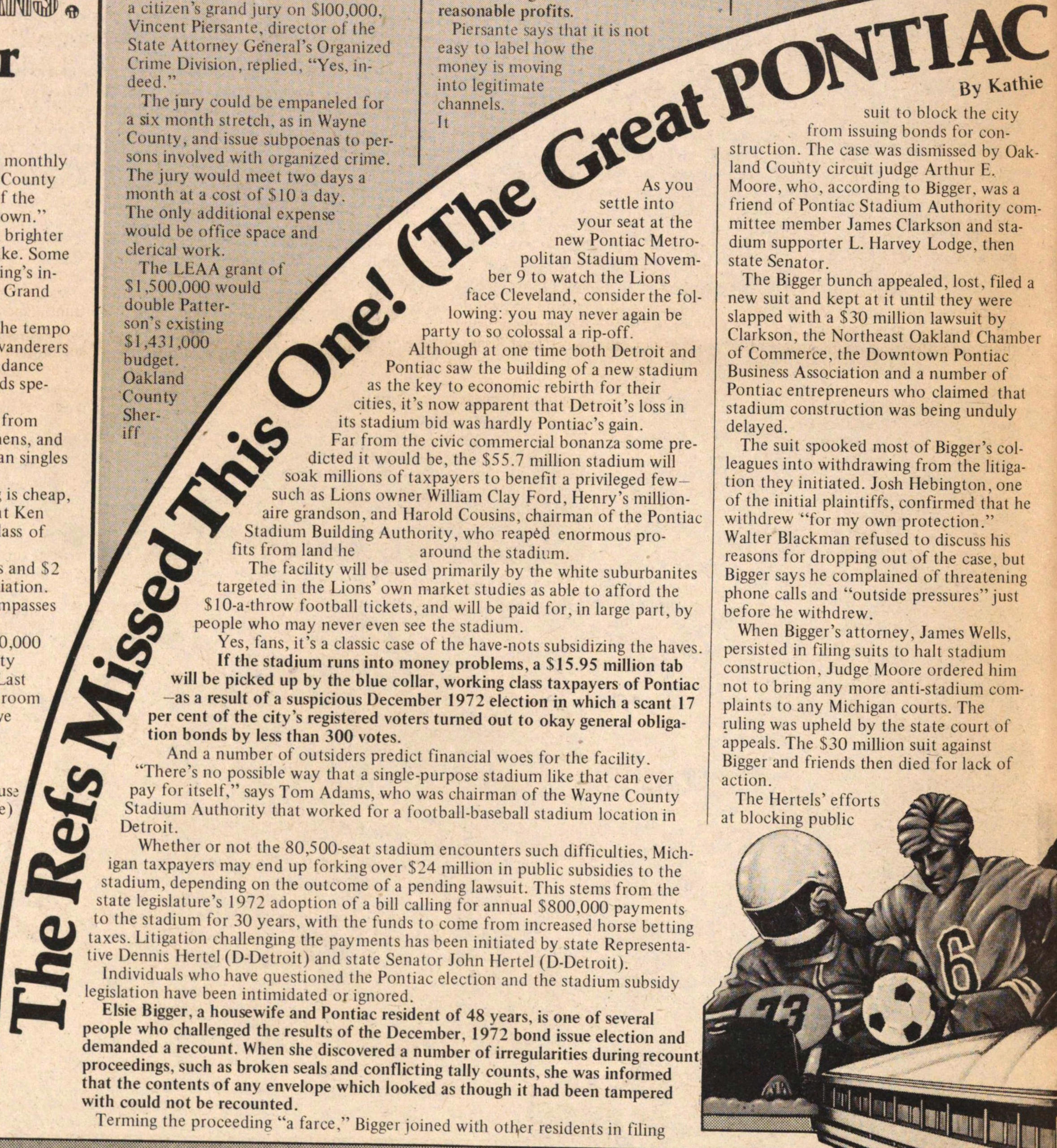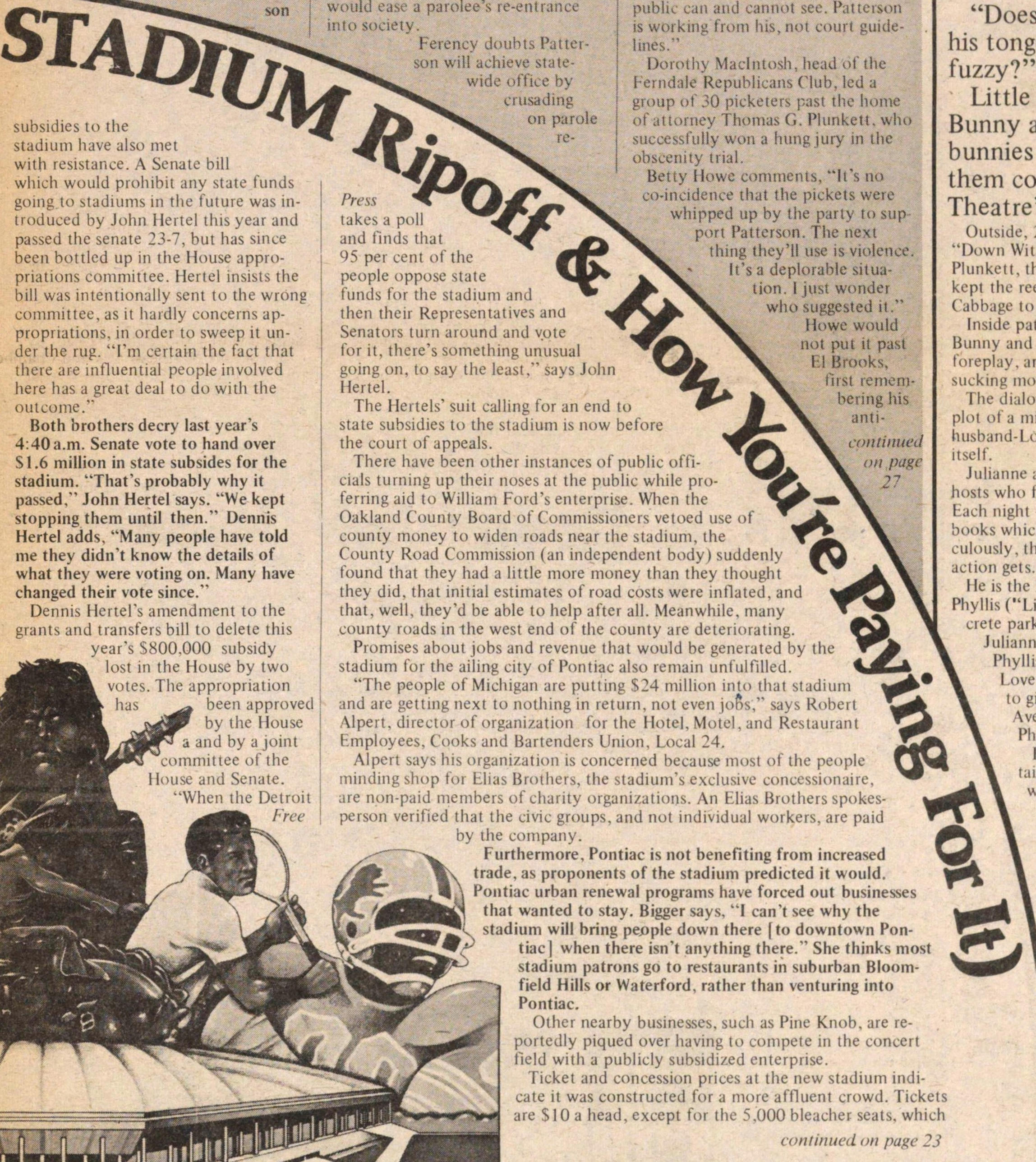The Refs Missed This One! (the Great Pontiac Stadium Ripoff & How Yor're Paying For It)



As you settle into your seat at the new Pontiac Metropolitan Stadium November 9 to watch the Lions face Cleveland, consider the following: you may never again be party to so colossal a rip-off. Although at one time both Detroit and Pontiac saw the building of a new stadium as the key to economic rebirth for their cities, it's now apparent that Detroit's loss in its stadium bid was hardly Pontiac's gain. Far from the civic commercial bonanza some predicted it would be, the $55.7 million stadium will soak millions of taxpayers to benefit a privileged few - such as Lions owner William Clay Ford, Henry's millionaire grandson, and Harold Cousins, chairman of the Pontiac Stadium Building Authority, who reaped enormous profits from land he around the stadium.
The facility will be used primarily by the white suburbanites targeted in the Lions' own market studies as able to afford the $10-a-throw football tickets, and will be paid for, in large part, by people who may never even see the stadium. Yes, fans, it's a classic case of the have-nots subsidizing the haves.
If the stadium runs into money problems a $15.95 million tab will be picked up by the blue collar, working class taxpayers of Pontiac - as a result of a suspicious December 1972 election in which a scant 17 per cent of the city's registered voters turned out to okay general obligation bonds by less than 300 votes.
And a number of outsiders predict financial] woes for the facility. "There's no possible way that a single-purpose stadium like that can ever pay tor itself”, says Torn Adams, who was chairman of the Wayne County Stadium Authority that worked for a football-baseball stadium location in Detroit.
Whether or not the 80,500-seat stadium encounters such difficulties, Michigan taxpayers may end up forking over $24 million in public subsidies to the stadium, depending on the outcome of a pending lawsuit. This sterns from the state legislature's 1972 adoption of a bill calling for annual $800,000 payments to the stadium for 30 years, with the funds to come from increased horse betting taxes. Litigation challenging the payments has been initiated by state Representative Dennis Hertel (D-Detroit) and state Senator John Hertel (D-Detroit).
Individuals who have questioned the Pontiac election and the stadium subsidy legislation have been intimidated or ignored.
Elsie Bigger, a housewife and Pontiac resident of 48 years, is one of several people who challenged the results of the December, 1972 bond issue election and demanded a recount. When she discovered a number of irregularities during recount proceedings, such as broken seals and conflicting tally counts, she was informed that the contents of any envelope which looked as though it had been tampered with could not be recounted.
Terming the proceeding "a farce," Bigger joined with other residents in filing suit to block the city from issuing bonds for construction. The case was dismissed by Oakland County circuit judge Arthur E, Moore, who. according to Bigger. was a friend of Pontiac Stadium Authority committee member James Clarkson and stadium supporter L. Harvey Lodge, then state Senator.
The Bigger bunch appealed, lost, filed a new suit and kept at it until they were slapped with a $10 million lawsuit by Clarkson, the Northeast Oakland Chamber of Commerce, the Downtown Pontiac Business Association and a number of Pontiac entrepreneurs who claimed that stadium construction was being unduly delayed.
The suit spooked most of Bigger's colleagues into withdrawing from the litigation they initiated. Josh Hebington, one of the initial plaintiffs, confirmed that he withdrew "for my own protection." Walter Blackman refused to discuss his reasons for dropping out of the case, but Bigger says he complained of threatening phone calls and "outside pressures" just before he withdrew.
When Bigger's attorney, James Wells, persisted in filing suits to halt stadium construction, Judge Moore ordered him not to bring any more anti-stadium complaints to any Michigan courts. The ruling was upheld by the state court of appeals. The $30 million suit against Bigger and friends then died for lack of action.
The Hertels' efforts at blocking public subsidies to the stadium have also met with resistance. A Senate bill which would prohibit any state funds going to stadiums in the future was introduced by John Hertel this year and passed the senate 23-7, but has since been bottled up in the House appropriations committee. Hertel insists the bill was intentionally sent to the wrong committee, as it hardly concerns appropriations. in order to sweep it under the rug. “I'm certain the fact that there are influential people involved here has a great deal to do with the outcome."
Both brothers decry last year's 4:40 a.m. Senate vote to hand over $1.6 million in state subsides for the stadium. "That's probably why it passed," John Hertel says. "We kept stopping them until then." Dennis Hertel adds, "Many people have told me they didn't know the details of what they were voting on. Many have changed their vote since."
Dennis Hertel's amendment to the grants and transfers bill to delete this year's $800,000 subsidy lost in the House by two votes. The appropriation has been approved by the House and by a joint committee of the House and Senate.
“When the Detroit Free Press takes a poll and finds that 95 per cent of the people oppose state funds for the stadium and then their Representatives and Senators turn around and vote for it, there's something unusual going on, to say the least," says John Hertel.
The Hertels' suit calling for an end to state subsidies to the stadium is now before the court of appeals.
There have been other instances of public officials turning up their noses at the public while proferring aid to William Ford's enterprise. When the Oakland County Board of Commissioners vetoed use of county money to widen roads near the stadium, the County Road Commission (an independent body) suddenly I found that they had a little more money than they thought they did, that initial estimates of road costs were inflated, and that, well, they'd be able to help after all. Meanwhile, many county roads in the west end of the county are deteriorating.
Promises about jobs and revenue that would be generated by the stadium for the ailing city of Pontiac also remain unfulfilled.
"The people of Michigan are putting $24 million into that stadium and are getting next to nothing in return, not even jobs,” says Robert Alpert. director of organization for the Hotel, Motel, and Restaurant Employees, Cooks and Bartenders Union, Local 24.
Alpert says his organization is concerned because most of the people minding shop for Elias Brothers, the stadium's exclusive concessionaire, are non-paid members of charity organizations. An Elias Brothers spokesperson verified that the civic groups, and not individual workers, are paid by the company.
Furthermore, Pontiac is not benefiting from increased trade, as proponents of the stadium predicted it would. Pontiac urban renewal programs have forced out businesses that wanted to stay. Bigger says, "I can't see why the stadium will bring people down there [to downtown Pontiac] when there isn’t anything there. She thinks most stadium patrons go to restaurants in suburban Bloomfield Hills or Waterford, rather than venturing into Pontiac.
Other nearby businesses, such as Pine Knob, are reportedJy piqued over having to compete in the concert field with a publicly subsidized enterprise.
Ticket and concession prices at the new stadium indicate it was constructed for a more affluent crowd. Tickets are $10 a head, except for the 5,000 bleacher seats. which go for $4.25 each. (Reserved seats for Lions games in Tiger Stadium were $7.50 and $8.50, and $4 each for the 3,000 bleacher seats.) The Lions now have the second highest average ticket price in pro football.
With the exception of beer, which is a nickel cheaper in Pontiac than in Detroit, concession prices at the new stadium are almost universally higher than at Tiger Stadium.
But while the general populace is being ripped off, the "haves" in the scenario continue to turn over tidy profits- including Ford, with his increased ticket revenues, and beverage king Cousins, who supplies beer to the stadium.
"Bill Ford is in the unique position of making a profit off a stadium built for him. without having much of an obligation to it." says Dennis Hertel.
Echoes Bigger, "The auto workers, the blue collar men, are the ones doing the work of backing up the stadium while everyone else benefits. It's too bad all the citizens of Pontiac couldn't make out as well as these fellows did."
Kathie Neff is a free-lance writer who formerly worked for a suburban Oakland County newspaper.
Article
Subjects
Freeing John Sinclair
Old News
Ann Arbor Sun